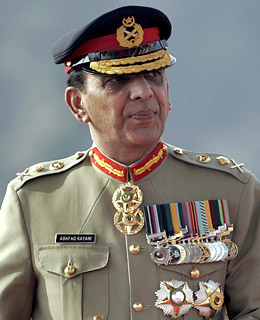
Until his promotion to army chief last fall, Ashfaq Kayani was the ultimate gray man, chosen, it seemed, for his lack of political ambition and his unwavering loyalty to his boss, Pakistani President Pervez Musharraf. But Kayani, 56, quickly showed that his loyalty lay with the nation he had served for nearly four decades, not with the man who had elevated him to the most powerful position in the country. On taking office, Kayani ordered the withdrawal of all military officers from lucrative posts in the civilian bureaucracy. As Pakistan went to the polls in February, Kayani kept the army out of sight, a first in a nation long accustomed to election results tinged by a khaki shadow. The message was clear: his army would stick to the barracks and the battlefields, not the ballot boxes.
Soldiers, friends, diplomats and politicians all extol his reasoned thinking and tempered judgment. "Kayani understands that he will have to restructure the military to go after extremists," says a Western observer in Islamabad. "The fight against extremism got a breath of fresh air when he came in." Fresh air is not usually the first thing that comes to mind when one describes Kayani — his voice has the deep crackle of a chain smoker, and he is rarely without his ivory-handled cigarette holder. But it looks as if he's planning to be seen and heard as little as possible.